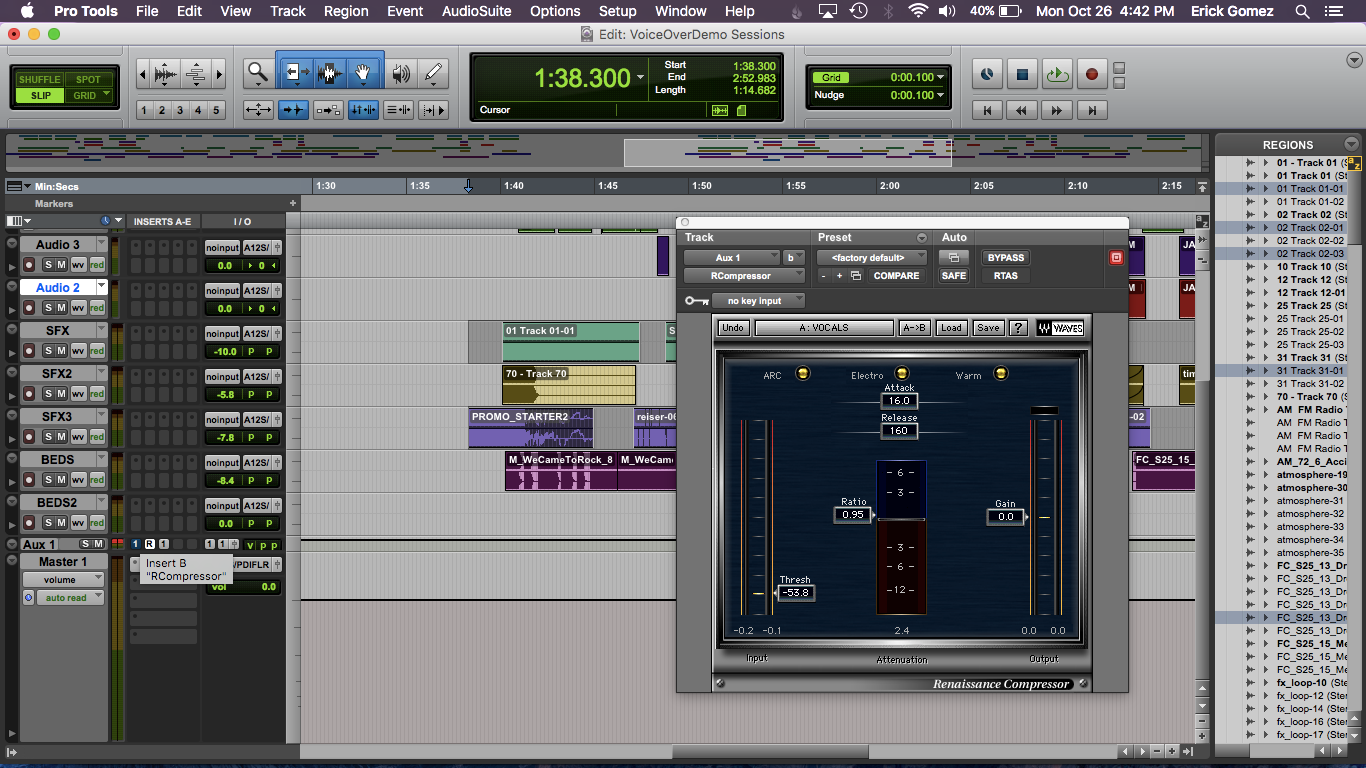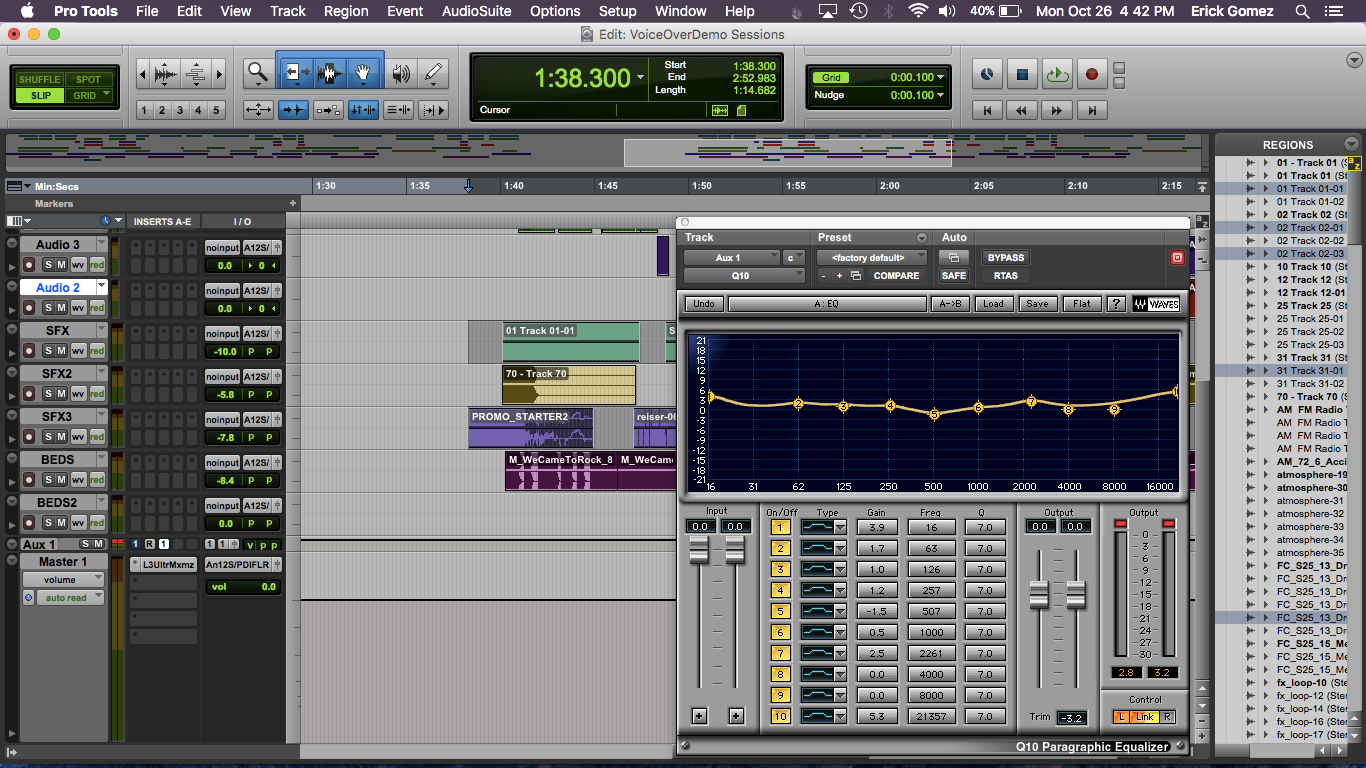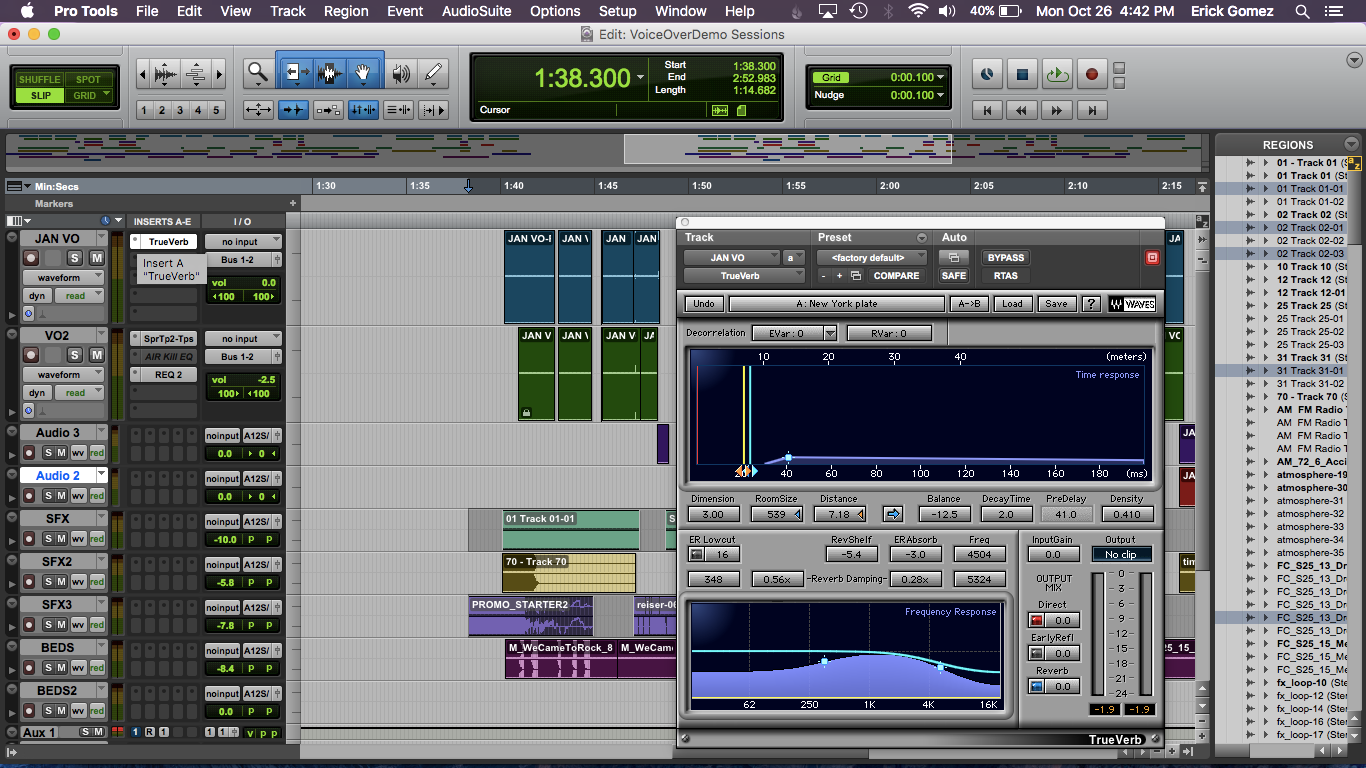|
HOME STUDIO To Sweeten The Mix, Here's How An Engineer/Producer Sees The Process January 15, 2015  Note: Generally, producers want voice actors to provide them with recordings that have not been processed (compressed, equalized, etc.). That lets the producer process the file to meet the individual client's needs. But if an engineer/producer were sitting next to you, here's a peek at the equipment and process he might advise ... Note: Generally, producers want voice actors to provide them with recordings that have not been processed (compressed, equalized, etc.). That lets the producer process the file to meet the individual client's needs. But if an engineer/producer were sitting next to you, here's a peek at the equipment and process he might advise ...By Erick Gomez Audio Engineer / Producer voiceoverdemostudio.com When it comes to audio sweetening, I like to keep things very simple. I believe there is such a thing as over-processing your audio. Much like how overcooking or overheating food can lead to less than desirable results, the same can be said about audio. The cliche ‘less is more’ applies here, and you should be judicious in how you apply your compression and effects. The one caveat I must point out,of course, is this: it all depends on the current project you’re working on. Obviously, audio for a spoken word podcast will and should be processed differently than say a bombastic, high energy commercial or piece of radio imaging. Time and practice are essential in developing a good ear and will help you determine how to tackle your current project. MY 'GO TOs' FOR PROCESSING From the very beginning I’ve leaned very heavily on the Waves plug-in bundle for Pro Tools because it’s what I learned to use when I started in radio, it makes everything sound great, and it is pretty straight forward. If it ain’t broke, don't fix it is what I say, and it’s been working for me for the better course of 15 years.  My "go-to’s”
for processing are any combination of Renaissance Compressor
(RCompressor) and L1+ Ultramaximizer to really punch up and level the vocals
without distortion. My "go-to’s”
for processing are any combination of Renaissance Compressor
(RCompressor) and L1+ Ultramaximizer to really punch up and level the vocals
without distortion. Essentially you are making the audio much louder without any clipping, but also with less dynamic range. This can often lead to what is referred to as "brick walling,” where the audio waveform can look almost like a solid block in your editor. This isn’t necessarily a bad thing, but you must determine whether this type of processing is right for your current situation. LISTEN, ADJUST SETTINGS I like to tweak and dial back the compression depending on the individual voice that I’m working with. You have to listen and adjust your settings according to the VO’s tone, either high pitched, low pitched, etc. Too much compression on a strong, low octave VO can sound over-modulated or over-saturated. Again, less is more, but it’s up to you as to what you think sounds best.  Next, I like to use the Q10 Paragraphic Equalizer. It’s
good to have granular control over the EQ of your audio, and this plugin gives
you all of that control and then some without throwing too many options at you. Next, I like to use the Q10 Paragraphic Equalizer. It’s
good to have granular control over the EQ of your audio, and this plugin gives
you all of that control and then some without throwing too many options at you.
You want to give your VO some depth, but not too much low end - and of course, also brighten it by bringing up the high ends. Essentially make your VO well-balanced without being completely flat. Bring up the mids, lows, and highs, but only enough to make the audio stand out from the mix. Again, these are just basic rules of thumb. You will have to adjust according to the VO you’re working with. Everyone’s voice has unique sonic properties that need to be well considered. DASH OF REVERB  And lastly, I like to use just a dash of TrueVerb reverb on the
VO audio because it gives the audio just a little bit more resonance without
being obvious. And lastly, I like to use just a dash of TrueVerb reverb on the
VO audio because it gives the audio just a little bit more resonance without
being obvious. I don’t use it on everything, but occasionally it will help your VO stand out just a tad more. Use wisely. And that’s about it. I don’t go crazy with my audio processing and you might not even have the Waves plug-in bundle, but the takeaway is this - it’s just a simple matter of compression and EQ. That’s all audio sweetening comes down to. If you have different software, that’s still great because these tools all essentially work the same. It just comes down to how you use them. And the greatest teacher of how to use these wonderful tools is time. ---------------------- ABOUT ERICK Erick Gomez is an audio engineer / producer with voiceoverdemostudio.com, based in New York, with over 10 years of experience directing talent and producing audio for commercial broadcast radio networks, including MTV Radio, VH1 Radio, CMT Radio, Univision, Westwood One, Viacom and the Spanish Broadcasting System (SBS). Email: info@voiceoverdemostudio.com Web: www.voiceoverdemostudio.com |
|
|
For essential voice-over business strategies
On Michael Langsner's Voice-Over Roadmap Podcast
With Sean Daeley and Paul Stefano - check it out!
Inspiring interviews help your VO career
As of the NEW website launch, 03/22/2012









.gif)
I wish there was a bit more here- just a few ball park numbers, maybe an example or two of the settings applied- fully realizing that MMMV. e.g. How much reverb is "a dash"? How little/much compression or limiting? Where do men/women typically need to look to cut when EQing?
[Slightly more ambitious might be an audio sample or two to compare the "raw" and the "sweetened". Lots of stuff out there on the interwebs for music vocals, but hardly any good quality examples on just the spoken voice by anybody worth listening to.]
Yes, in ideal circumstances the VO artist is sending the unadulterated audio file, to leave any and all processing in the hands and ears of skilled engineer with audio skills.
However we all know there are those many circumstances where there is no such qualified AUDIO engineer, and what the client wants is pretty much finished "good sounding" audio to lay in a track. In those situations, especially lower-budget, rush jobs, auditions, test videos, etc.- in other words the VO artist is unfortunately the most skilled (earwise and engineering wise) person along the line. So it's nice to have an idea to what to do in such cases, as you say, as if a real engineer/producer were sitting right next to you.
With all due respect...
Whats simple to an audio engineer with years of experience is not that simple to a voice actor with limited experience. Plug-ins are great if you know specifically what you're trying to achieve. If you don't know "what its supposed to sound like," and you are listening to the audio in less that a good acoustical environment you're pouring sour milk into the pancake mix.
Pro-Tools is a magnificent recording program for production, especially for music and for creating mastered commercials. A great tool for sweetening the mix.
For a voice actor with a home studio, and limited experience with proper acoustics, and your limited explanation of what you're talking about as far as the use of these plug-ins, Pro-Tools is not a prime tool to use for simple, single track, mono voiceover. The idea is to keep it simple. The idea at the top of your article says it properly. Let the engineers do the engineering.
I'm not saying people can't learn the fine art of recording and mastering. Little tweaks are ok. But it requires a thorough explanation of what EQ, does, what compression does, and "a little reverb" will do if you have no clue what the proper amount of reverb is. Yes, play with them, learn them, but don't start throwing them into your auditions until someone who knows "what its supposed to sound like" says, that's what it's supposed to sound like. Engineers like yourself who went to recording school or spent years learning their craft under the eyes and ears of an experienced professional should be very careful when throwing terminology around without examples of what they mean.
I'll bet you just love when someone sends you an over-processed file. What a time waster. You gave them a hammer to push in a thumbtack.
Dan Lenard
The Home Studio Master
home voice over studio consultant
homevoiceoverstudio.com